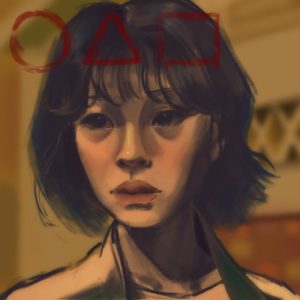“Happiness” brilliantly uncovers humanity’s monster of greed in a well-written apocalyptic, zombie-romance

photo via Rakuten Viki
Unlike what it sounds like, “Happiness’ isn’t lighthearted or fluffy, but it instead tells a tale of human greed and psychology. The 12-episode series first aired on November 5, 2021 on Viki.
February 8, 2022
Warning: This story includes mild spoilers for the K-drama “Happiness.”
“Happiness is not the absence of problems, but the ability to deal with them.” – Steve Maraboli
Monsters: blood-sucking vampires, brain-eating zombies, or frightening ghouls. Monsters are often primary antagonists in the mainstream media, painted in a negative light as demons who hinder the main characters. However, what happens when the “monsters” aren’t actually the villains, but it is the humans who label them as such?
With clever writing and an amazing color palette, Korean drama series, “Happiness” effectively portrays the image of humans during a pandemic and the true monsters people may become when put in a life-threatening situation. It is an amazing analysis of human psychology and the socio-cultural behavior of humans during a crisis.
Less zombie and apocalyptic, but more thriller and psychological, the drama stars Yoon Sae-bom (Jung Yi-hyun) and Han Hyo-Joo (Park Hyung-sik); the main leads and special forces and police officers, respectively. The couple has just gotten married and moved into a new, luxurious apartment. After finding out that the police department is giving away free luxurious apartments to exemplary officers, our main characters, being high-standing officers of justice already, get married on a whim to gain “marriage points,” and win the apartment.
Contrary to their expectations of a peaceful life, they are welcomed by their unique apartment guests, most of which discriminate against our new tenants since they come from a poorer background and are on the lower floors of the apartment complex. By building brick walls and restricting them from using the community gym, the physical barriers represent social barriers that are already present.
Add in an overtaking virus that causes humans to have extreme thirst and bloodlust for humans (turning them into monsters), a forced quarantine and cooperation between the residents, a flurry of murders and manipulation, and “Happiness” truly starts to begin.
The virus, “Next,” which originated from a pill, can be passed on by biting and scratching humans, and of course taking the pill itself. There is a mist of uneasiness in the air surrounding the drama as characters are revealed to have connections with the origin of the deadly virus or have contracted it, but choose to hide it in the fear of being banished from the apartment. The government doesn’t do much to help the residents of the apartment, and they place a physical wall around the entire building to make sure the virus doesn’t spread. Spoiler alert—it does spread.
This further isolates the residents, with only the main characters having access to a walkie-talkie that can allow them to communicate with the outside world. Our characters must not only fight to stay alive, but also over basic necessities like water and power, which the government’s higher-up officials want to turn off to save money (because they think everyone in the apartment will inevitably die).
Being riddled with monsters, running out of food and water, and having no contact with anyone outside their building, every character is stranded and a true test of survival takes place.
However, the true monster doesn’t lie in those infected, but in the actual residents of the apartment, who will do anything it takes to survive – even if it means pushing those around them to death. Their innate selfishness along with a combined fear work together. By creating obstacles for the main characters and urging characters of lower social class to sacrifice themselves instead, it is clear that in the process of staying away from the “monsters,” they have become monsters instead.
The drama’s psychological twist on humanity thrills its viewers. When we see characters do anything to fulfill their motives of survival, power, and money, including teaming up with a serial killer, it is evident that they are no longer human (even though they haven’t been infected). Every action leaves one gripping their seat and the painful cliffhangers between each episode add to the anticipation of the series.
Ultimately, by the last episode, the facade that characters have been putting up fully crumbles down, and they reveal their inner beast. Whatever persona they have tried to uphold shatters, and every character turns out to be something viewers would have never imagined them to be.
In particular, we learn about the apartment’s building manager, a seemingly rich woman who works to exercise power over the apartment’s residents. However, she turns out to be the poorest resident of them all; despite living in the tallest and richest apartment, she has no furniture and lives a life of lying to the other residents about her social status. Another character, a confident and crookly doctor, who murdered his wife after she found out about his affair, becomes a weak coward in the end of the drama.
“Happiness” has brilliant writing, and character interactions with or against each other make the highlight of the drama. It is a truly addictive must-watch for anyone who enjoys thriller and romance.
The series also highlights the social injustice present between people of different social classes and monetary backgrounds. For example, a couple, who works as janitors for the apartment becomes trapped after the quarantine happens, is looked down on by the residents, simply because they can’t afford to live in the apartments. This leads to the couple being forced to risk their lives by the residents since they are from a lower social class. Ultimately, even these characters become corrupted in the end and their true greed is revealed. The drama shows that even in times of survival, people put their pride first.
Taking place after the coronavirus pandemic, the drama effectively incorporates the uneasiness around coronavirus. Unlike most American TV shows, like “Grey’s Anatomy”, whose plot seems to have tried too hard to include a COVID timeline in their new season, it is almost natural here. The experience of facing a pandemic in the real world before plays into the various characters’ reactions toward this new perilous one. Signs like “smiles can be seen through masks too” and the show’s toned down color palette, consisting of grays and blues, add to the dreary atmosphere.
In contrast to the bleak blues and grays, the yellows that our main characters wear and the poignant blue of the sky symbolize the little bit of optimism that our main characters have. Through strong leadership and amazing allies, they argue that the infected are still humans too, spreading positiveness in a situation of death. It is the perfect juxtaposition, allowing for a more thrilling watching experience and representing how people felt in the COVID-19 pandemic.
In the end, the drama may be a picture of the current world we have, where one places their own survival and the survival of their loved ones over the well-being of the world. It might even be an image of a future world, where one would go to great lengths to ensure they live, even if it means they cross lines we vowed never to. A true epitome of human greed and the monster that comes out of it, “Happiness” teaches the lessons of staying true to kindness, choosing compassion through its exceptionally written characters (and their actors’ brilliant acting) and a riveting plot.
The combination of colors and dramatic music present in each episode, along with the constant setting of a luxurious apartment that seems to break down more and more every episode make for a brilliant drama. Each plot twist is more unexpected and each character’s mysteries are revealed slowly, making the drama more worth watching.
It is ironic how the drama’s title is “Happiness,” but there is no happiness present in this drama. Despite our main characters being a newly-wed couple, there aren’t many heartwarming moments in the drama, and the only joyous ones are simply relief from watching them stay alive. This drama does the perfect job of explaining that true happiness comes from the people you are with rather than the material goods you might have. Living in a luxurious apartment and flaunting around one’s social class doesn’t in the end affect their survival; it is only the people they are with, good or bad.
The only flaw to this masterpiece is its seemingly rushed ending after 12 episodes. However, it is made up for by the chilling plot twists and cliffhangers that we are left off with every episode. Including a little fan service in the last episode, “Happiness” is equally exciting and thrilling, making it a must-watch. It explores the boundaries of the genre while staying rooted in reality, leaving the viewers fully satisfied.
Similar dramas include “Sweet Home,” which is also about an apocalyptic apartment complex, and “Alice in Borderland,” both of which you can watch on Netflix. “Happiness” may be one of the best K-dramas in 2021 and it was the perfect way to end a year of uneasiness. Once again, ‘monsters’— they may not be zombies or witches, but rather are a product of human greed and nature.
The true monster may not be a fictional character, but the ones that are in front of you or inside you. “Happiness” makes it clear that finding ways to deal with these “monsters” can lead to one’s true happiness.




